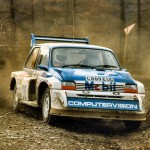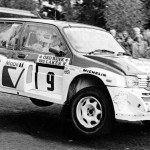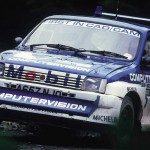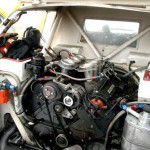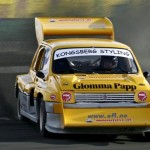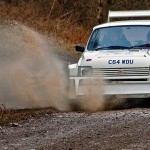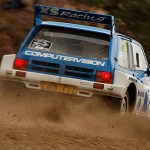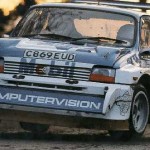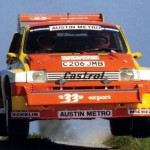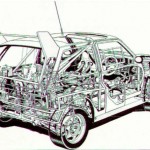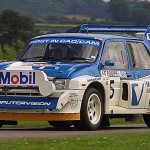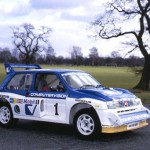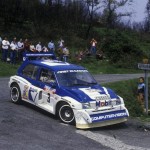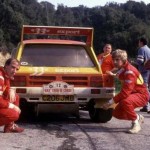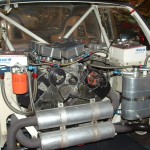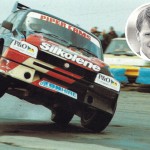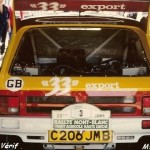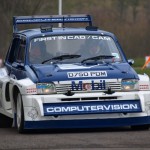Rally Monster – MG Metro 6R4
 At the start of the 1980s, Austin Rover reached a crossroads in its efforts to take on its chief rivals – notably Audi, Ford and Opel – in the increasingly competitive world rally championship. Despite finally making its V8-engined Triumph TR7 competitive and reliable against the hordes of Ford Escorts that had dominated events of the past decade, the company fell out of love with the TR7 project and went back to the drawing board.
At the start of the 1980s, Austin Rover reached a crossroads in its efforts to take on its chief rivals – notably Audi, Ford and Opel – in the increasingly competitive world rally championship. Despite finally making its V8-engined Triumph TR7 competitive and reliable against the hordes of Ford Escorts that had dominated events of the past decade, the company fell out of love with the TR7 project and went back to the drawing board.
Following the climax to the 1980 WRC season, Austin Rover’s competition department, led by former international co-driver John Davenport, thrashed out a plan to mix it with the best of them with a brand-new machine.
To do this, Davenport called on the engineering expertise of the Williams Grand Prix team, which had just won the Formula 1 world title with Alan Jones and the ahead-of-its-time, Cosworth-powered FW07.
The car to take Austin Rover to the forefront of arguably the world’s toughest motorsport was its humble Metro. But the rally car would have to push the concept far beyond its status as the ubiquitous, but uninspiring, family ‘bubble’ car.
 What Williams designed would eventually become one of the most revered and iconic rally machines in the history of the sport. So much so, in fact, that it would continue to win at international and national level through the 1990s and into the 2000s.
What Williams designed would eventually become one of the most revered and iconic rally machines in the history of the sport. So much so, in fact, that it would continue to win at international and national level through the 1990s and into the 2000s.
After a year’s development work in 1983 by top British driver Tony Pond, a man who had given the Triumph TR7 V8 a number of high-profile victories, on a prototype codenamed VHPD (Very High Performance Derivative), the 6R4 as we know it was born. The stubby and aggressively purposeful car was powered by a V8 ‘test hack’ engine mounted amidships, while power was transmitted to all four wheels.
The noteworthy occasion of the 6R4’s competition debut came on a British national event in Yorkshire in early 1984. The car was an instant force to be reckoned with, taking numerous fastest stage times and pulling out a lead of almost three minutes before alternator trouble put paid to its run.
 The pace of the car in the York National Rally was enough to convince Austin Rover that the project warranted continued impetus. For the rest of 1984, the 6R4 was entered into numerous events – all of which helped the engineering team better understand, and therefore improve, its new car. The ultimate aim, of course, was the World Rally Championship – a more serious proposition than British national events.
The pace of the car in the York National Rally was enough to convince Austin Rover that the project warranted continued impetus. For the rest of 1984, the 6R4 was entered into numerous events – all of which helped the engineering team better understand, and therefore improve, its new car. The ultimate aim, of course, was the World Rally Championship – a more serious proposition than British national events.
The 6R4’s first victory came in the forest of Wales in February 1985 on the Gwynedd Rally and Austin Rover spent much of the rest of that year developing the car with the aim of getting it homologated for the new Group B formula to which the WRC would infamously adhere.
 Part of that WRC-inspired focus was the mating of an all-new, three-litre, six-cylinder engine designed by former Cosworth engineer David Wood to the 6R4 chassis. The unit came in two distinct levels of ‘tune’: the Clubman-spec engine produced 250bhp and would give the 6R4 a strong customer appeal for many years, while the International-spec motor churned out up to 410bhp.
Part of that WRC-inspired focus was the mating of an all-new, three-litre, six-cylinder engine designed by former Cosworth engineer David Wood to the 6R4 chassis. The unit came in two distinct levels of ‘tune’: the Clubman-spec engine produced 250bhp and would give the 6R4 a strong customer appeal for many years, while the International-spec motor churned out up to 410bhp.
 Having satisfied the homologation requirements decreed by the rulemakers, Austin Rover set about giving the 6R4 its WRC competition debut.
Having satisfied the homologation requirements decreed by the rulemakers, Austin Rover set about giving the 6R4 its WRC competition debut.
Scheduled to appear in the final round of the 1985 WRC, Britain’s RAC Rally, the 6R4 had created unprecedented levels of interest among British rally fans and the story-hungry sporting press.
MORE: Sideways through the streets in an MG Metro 6R4! (video)
Two blue-and-white Metro 6R4s driven by Tony Pond/Rob Arthur and Malcolm Wilson/Nigel Harris duly took the start of the 1985 RAC with the hopes of the nation fully behind them.
For Pond, the event almost had a dream result. Running at the front throughout, he gave the pair of factory-run Lancia Delta S4s driven by Henri Toivonen and Markku Alen a real fright, only settling for third when the promise of a debut podium finish became too good to throw away.
 And that’s when British rally fans fell in love with the Metro 6R4 – an unlikely looking rally weapon, but one that was created by a small bunch of enthusiasts to satisfy a patriotic desire to get in on the act and give British rallying a much-needed boost.
And that’s when British rally fans fell in love with the Metro 6R4 – an unlikely looking rally weapon, but one that was created by a small bunch of enthusiasts to satisfy a patriotic desire to get in on the act and give British rallying a much-needed boost.
To this day, the 6R4 can be seen competing on national events around Europe. It’s a car that took over from Ford’s legendary Escort as the mainstay of the British rallying scene. And as for that sublime, normally-aspirated, throaty V6 soundtrack emitted from just behind the seats…
Read more feature stories here

